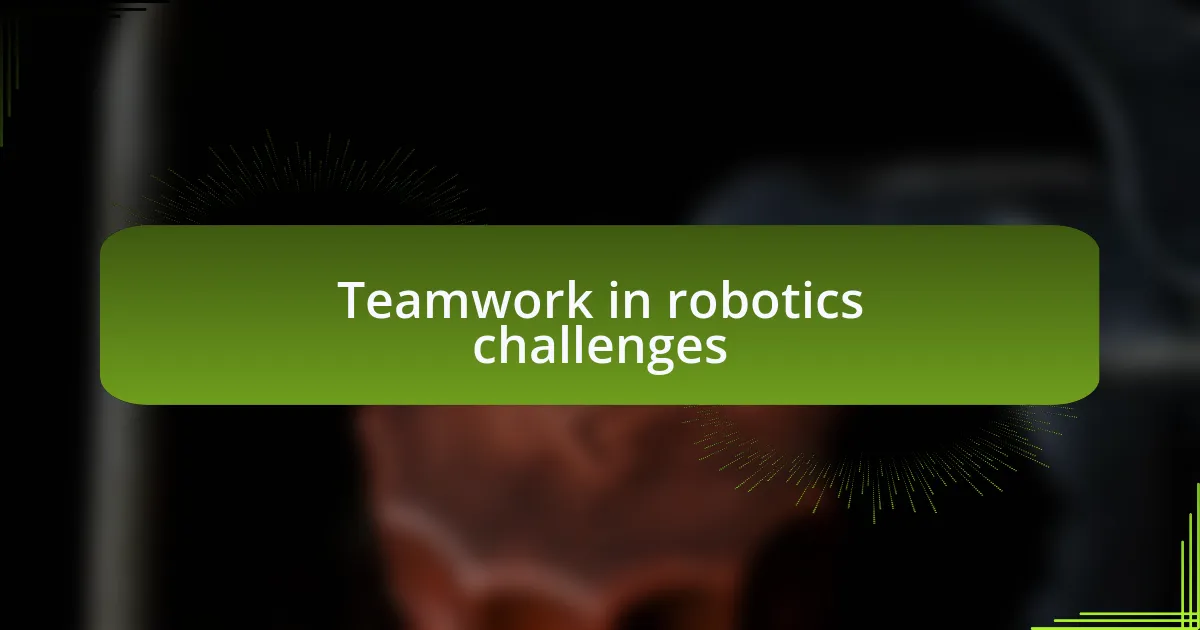Key takeaways:
- Robotic competitions foster learning, teamwork, and problem-solving skills, enhancing participants’ resilience and innovation.
- Strong collaboration and diverse skills are essential for overcoming challenges, leading to successful engineering projects.
- Experience in robotics competitions cultivates adaptability, time management, and effective communication under pressure.
- The skills gained in robotics have valuable applications across various fields, emphasizing the importance of ethical considerations in technology.

Understanding robotic competitions
Robotic competitions are fascinating arenas where creativity meets technical skill. I vividly remember the first time I witnessed a match; the energy was electric, and I was captivated by how teams of young engineers collaborated under pressure. Have you ever felt that rush when you see a robot successfully complete a challenging task? It’s a unique blend of excitement and pride that makes these competitions unforgettable.
At their core, robotic competitions serve as platforms for learning and innovation. Each event is not just about the robots but also about what the participants gain in terms of teamwork, problem-solving, and resilience. I recall a project where my team faced a major setback during testing. Instead of feeling defeated, we rallied together, brainstorming solutions and ultimately enhancing our design. Isn’t it remarkable how obstacles can lead to growth?
The range of challenges in these competitions can be both daunting and exhilarating. From navigating obstacle courses to performing complex tasks, there’s always something new to learn. I often found myself reflecting on how these challenges mirror real-world engineering problems. Each victory, whether big or small, instills a sense of accomplishment that lingers long after the competition ends. How do you think competition fosters innovation in engineering?

Importance of engineering technology
Engineering technology plays a pivotal role in shaping our modern world. I often think about how cutting-edge innovations can transform daily life, making processes more efficient and accessible. Can you imagine a world without the smart devices we rely on daily? It’s through engineering technology that we can push boundaries and create solutions that matter.
In numerous competitions, I’ve witnessed firsthand the importance of engineering technology in developing critical thinking and analytical skills. During a tournament, my team had to rapidly adapt our strategy when our robot malfunctioned. This real-time problem-solving experience underscored how essential engineering technology is not just in practice, but in fostering a mindset ready to tackle unforeseen challenges. Have you ever been in a situation where adapting on the fly became your greatest strength?
Moreover, engineering technology drives collaboration and cross-disciplinary teamwork. I remember collaborating with students from different areas of expertise, like computer programming and mechanical engineering. Each contribution was vital, and it reinforced the idea that diverse skills are essential for successful engineering projects. How often do we see the best outcomes arise from collaborative efforts? It’s a powerful reminder that engineering is not just about individual brilliance but about harnessing collective talent to drive innovation forward.

Skills gained from competitions
Competing in robotics has sharpened my technical skills in ways I never anticipated. For instance, during one competition, I was tasked with programming our robot’s navigation system. It was a challenging yet exhilarating experience that taught me not only coding languages but also how to troubleshoot and optimize under pressure. Have you ever found yourself in an intense situation where the clock is ticking, and your skills are truly put to the test?
Another vital skill gained from these competitions is time management. Balancing time between design, building, and testing was a lesson in prioritization. I vividly recall a sleepless night spent tweaking our robot just hours before the competition. This taught me to allocate my time effectively and reinforced the importance of planning ahead, a skill that transcends the workshop and touches all areas of life. How valuable could these lessons prove when deadlines loom in future projects?
Additionally, I honed my communication skills, both verbal and non-verbal, during team discussions and presentations. Presenting our project to judges required clarity and confidence, pushing me out of my comfort zone. There was a moment when I had to explain complex concepts to judges who had non-technical backgrounds, making me realize how crucial it is to convey ideas simply and effectively. Have you ever had to adapt your language to your audience? Embracing this ability to communicate across diverse groups is essential in any engineering role.

Teamwork in robotics challenges
Collaboration is at the heart of robotics challenges, and I found this out firsthand when my team faced a mid-competition crisis. Our robot malfunctioned just before a critical run, and it was all hands on deck to diagnose the problem. The collective brainstorming, where each member contributed ideas, reminded me how diverse perspectives can lead to innovative solutions. Have you ever felt that rush of creativity when teamwork ignites?
During one competition, we struggled with differing opinions on our design approach. Instead of letting this tension derail us, we chose to embrace our conflicts. We held a mini-debate, weighing pros and cons, which not only built respect among team members but also led to a hybrid solution that merged the best of both ideas. This experience deepened my understanding of how constructive disagreement can pave the way for stronger outcomes. How often do we shy away from differing viewpoints, missing opportunities for growth?
In moments of high stress, I learned that supporting one another emotionally is just as vital as technical skills. The night before a final showdown, I remember seeing a teammate overwhelmed with anxiety. Instead of focusing solely on our robot, we took a moment to regroup, share our fears, and uplift each other. This camaraderie not only strengthened our bond but also helped us approach the competition with renewed confidence. Have you felt the power of encouragement within a team? Recognizing the emotional aspects of teamwork transformed my view on collaboration in engineering.

Overcoming technical obstacles
When faced with technical problems during competitions, learning to adapt quickly became my lifeline. I remember one instance where our robot’s software crashed minutes before a major round. Instead of panicking, our team split up—some of us dove into the code while others double-checked the hardware connections. Witnessing everyone’s focus and dedication was exhilarating; I realized that resilience often shines brightest under pressure. Have you ever been in a situation where urgency forced you to innovate?
Another memorable moment happened when we encountered a design flaw in our robot’s mechanics just hours before our presentation. Rather than succumbing to frustration, we embraced the challenge. I took a breath and proposed we pivot to a simpler design, which could perform the essential tasks effectively. That decision revealed a crucial lesson: sometimes, going back to basics can yield the most efficient solutions. Have you ever felt that urge to simplify a complicated process, only to discover the magic within simplicity?
Technical obstacles also taught me the importance of thorough documentation. During the competition, I reflected on how previous iterations of our design were critical references when malfunctions arose. I shared this insight with my teammates during a debrief, highlighting that meticulous note-taking could save us time and headaches in the future. This experience reinforced that building a strong foundation through detailed records is just as vital as the creative aspects of engineering. Do you keep track of your processes, or do you find it easy to forget what works?

Personal growth through robotics
While participating in robotics competitions, I discovered that personal growth often stems from collaboration. In one particularly intense competition, I encountered a teammate who struggled with a specific programming task. Rather than letting frustration seep in, I took the time to mentor him. Watching his confidence grow as he grasped the concepts was incredibly rewarding. Have you ever experienced a moment where helping someone else also helped you grow?
Communication skills also flourished for me during these competitions. I vividly recall standing in front of a panel of judges, nervous yet excited. My task was to present our robot and address technical questions. Preparing with my team boosted my ability to articulate complex ideas clearly and confidently. How have your experiences shaped your ability to communicate under pressure?
Additionally, the spontaneity of competition forced me to embrace uncertainty. There were times when our strategies didn’t go as planned, and I had to think on my feet. I remember one event where our robot performed unexpectedly, leading us to rethink our entire approach. That moment taught me that adaptability is vital—not just in robotics, but in life. Do you find it challenging to embrace change, or do you see it as an opportunity for growth?

Future applications of robotics skills
The skills I’ve gained in robotics competitions have far-reaching applications in various fields. For instance, teamwork and problem-solving are crucial in sectors like healthcare, where multidisciplinary teams must collaborate to innovate surgical techniques. I remember discussing with a mentor how the collaborative spirit in a robotics lab mirrors the dynamics of an operating room. Isn’t it fascinating how the very principles we’ve honed in competitions can make a difference in saving lives?
Looking ahead, I see robotics skills playing a pivotal role in industries like automation and artificial intelligence. As I’ve delved into programming and engineering, I’ve often thought about how these technical skills translate into developing smart systems. It’s a thrilling prospect to think that the knowledge I gained building robots could contribute to the creation of autonomous vehicles. Have you ever wondered how your hands-on experiences could innovate the very technology we rely on every day?
Moreover, my experiences have instilled a deep appreciation for ethical considerations in technology. It’s crucial to approach robotic advancements with an understanding of their social implications. Reflecting on discussions within my team about responsible design has shaped my perspective on engineering practices. How do you think we can ensure that technology benefits everyone while minimizing risks?